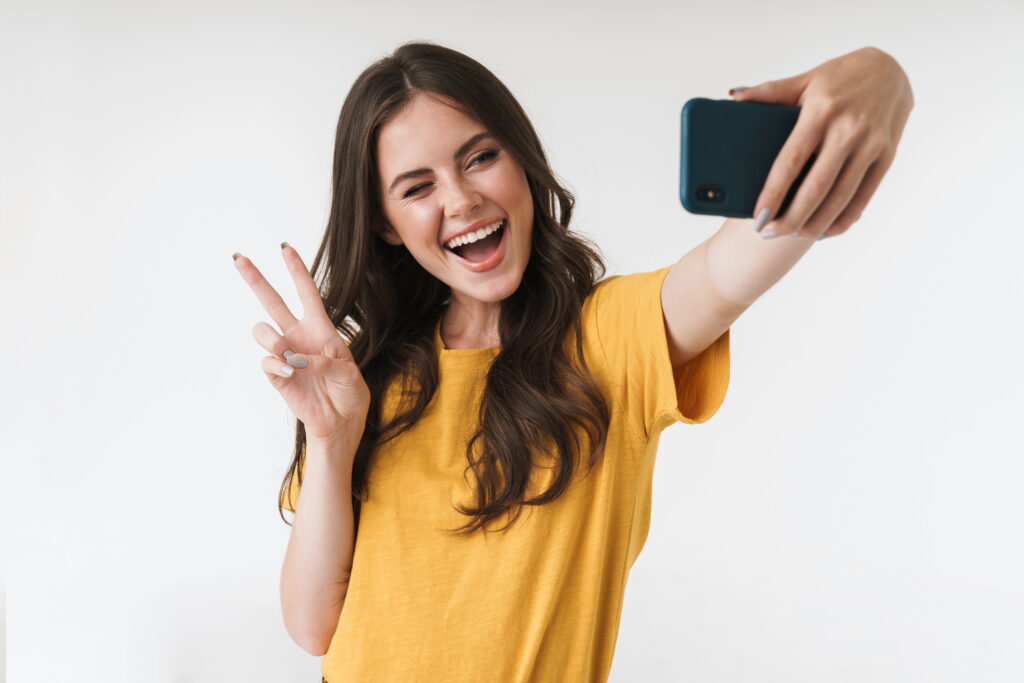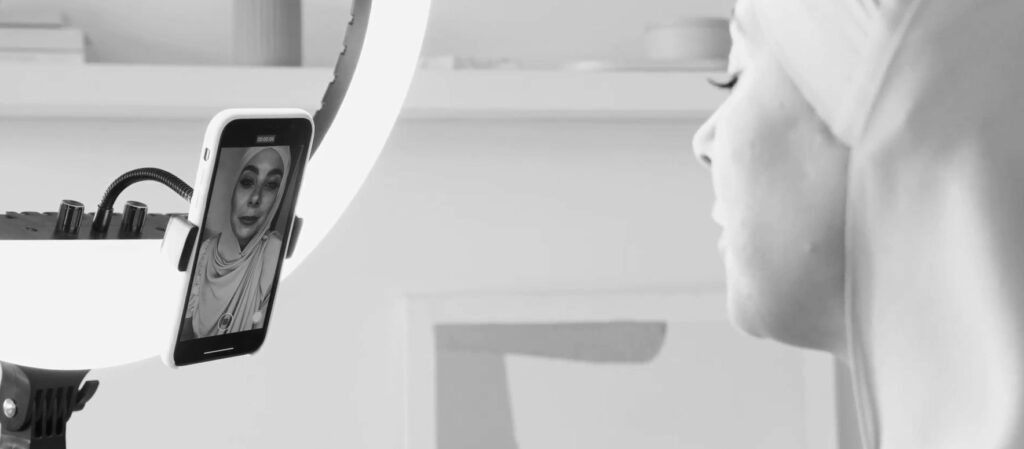As “beauty filters” proliferate on social media platforms like TikTok, journalist Elise Hu says we’ve entered the era of the technological gaze, where the digital world shapes real-world beauty standards. She explains how to navigate this new reality in all its forms — and why you should reject the idea that your appearance dictates your worth.
Watch the beginning of the video (00:00-2:05) and complete the gaps with the missing words:
Earlier this year, I was in Taipei, Taiwan, where I decided I wanted to make a TikTok about cup noodles, only this brilliant TikTok never happened because of the shock I got when I opened up the app and flipped it into selfie mode. The face looking back at me was a face, but not exactly my face. A whole 1. …… of beauty filters had automatically 2. ……. me ……., and I could not turn them off.
There was so much going on here, skin smoothing, skin lightening, tanning, teeth whitening, nose narrowing, bigger eyes, and it gave me a thinner, softer 3. ………. . This was a whole lot of 4. ………….. filtering, or what someone joked was forced catfishing. And for me, it’s the perfect example of something called the technological 5. …….. at work.
What is it? Well, women have had to play to the male gaze forever, you know what that is, but the technological gaze describes an algorithmically-driven perspective that we learn to 6. …………, perform for and optimise for, and then by taking in all our data, the machines learn to perform us in an endless feedback loop. We learn it so young. An estimated 80 percent of 13-year-old girls in America have already used filters or some kind of editing to 7. …….. their appearance online.
And these days, the filters are hyper-realistic, because they tend to be AI-generated. They come with a suite of characteristics teaching us how to look, things like arched eyebrows or higher cheekbones or 8. …….. lips. What then happens is we see the gap between the way we look in the mirror and the way we look in these filters, and the digital world begins to dictate real-world beauty standards.
We’ve seen it in celebrity culture, and I know this because I saw it when I lived and worked in Seoul, South Korea, as the NPR bureau chief there nearly 10 years ago. Seoul is all about optimising your face and your body. If you want your vagina 9. ……….., your skull reshaped, any part of your body lifted or 10. ……….., have at it.
It’s the cosmetic surgery capital of the world. Nearly half of all Korean women have already undergone some kind of plastic surgery. By the time they’re in their 20s, no other place 11. ……….. . (…)
Key: 1.array; 2. worked (me) over; 3. jawline; 4. nonconsensual; 5. gaze; 6. internalise; 7. alter; 8. plump; 9. rejuvenated; 9. enhanced; 10. comes close
Glossary
loop – (here) a cycle that keeps repeating because each step feeds back into the next
suite – a group of things forming a unit or constituting a collection; set
augmentation – the process of increasing the size, value, or quality of something by adding to it
Practice makes perfect
Read the article:
https://www.scientificamerican.com/blog/observations/how-selfie-culture-is-changing-our-lives/
and fill in the sentence gaps with the words in bold below:
life-logging, cyborgs affordance
undermine crutch curating
1. Some people argue that social media has become a ………., something we lean on instead of relying on our own memory.
2. In the 1980s and 1990s, the first so-called ……….. walked around with heavy equipment, documenting every aspect of their lives.
3. Constantly checking your phone while talking to someone can ………… the quality of your relationships.
4. Early adopters of wearable cameras experimented with ……………, recording every moment of their daily routines.
5. With thousands of digital photos, many users have started ………….. their collections, carefully choosing which ones to share.
6. The smartphone is an ……………. that allows us to capture, edit, and publish images instantly.
Key: 1. crutch; 2. cyborgs; 3. undermine; 4. life-logging; 5. curating; 6. affordance
Discuss
- How do beauty filters on apps like TikTok influence users’ perception of their own appearance?
- What is the speaker’s main concern about AI-driven beauty standards?
- How would you explain “pretty privilege” or “lookism” in your own words?
- Do you think beauty filters and AI-altered images harm self-esteem? Why or why not?
- In what ways do digital beauty standards differ from cultural beauty standards in the real world?
- The speaker says, “AI’s idea of attractiveness is only increasingly inhuman.” Do you agree with this statement?
- What solutions does the speaker suggest for challenging harmful beauty standards? Do you think they are realistic?
- Have you ever used a beauty filter or edited your photos online? How did it make you feel?
- How much pressure do you feel from social media or apps to look a certain way?
- Imagine a world where AI determines “ideal” beauty. What might be the consequences for people who don’t fit that ideal?
- Do you agree with the statement “I document, therefore I am”? Why or why not?
Watch and Revise!
Digital Culture
Transforming Faces & Lives
https://www.cloud.worldwideschool.pl/index.php/s/qJQde6R9QKs4Kc9
(6404)






